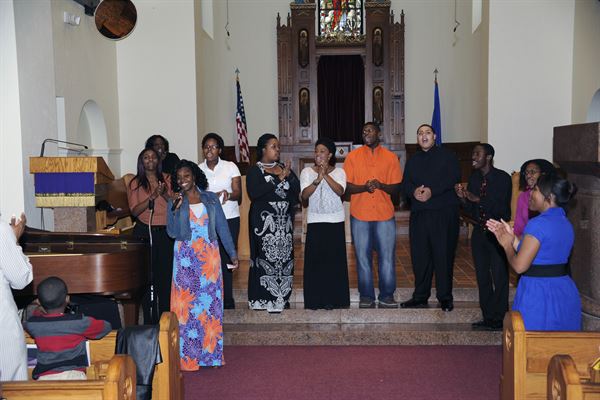One of the joys of my position as the Director of The Center for Congregational Song is to be asked interesting questions from people who are working week in and week out to get their congregations singing. This series of blogs will take some of the questions I’ve been asked and post the answers publicly.
THE QUESTION
Hi Brian,
Hope all is well!
I’m at a new church now! Woot! It isn’t technically a new church plant, but we are starting from the ground up. The numbers are at an all-time low, but the remaining few in the congregation are excited about the future and re-making their congregation into one that is vital and active in their community. It’s a Presbyterian (USA) congregation in a major metropolitan suburb.
One of the first things we need to do is establish a worship culture. What will our worship look and sound like? So here are a few things I’m curious about:
- How to hire a new music director. We have an interim right now, but we need a new music person who knows congregational singing, percussion….ways to layer and texture music.
- Now that I’m settled in here and driving this liturgical ship, I want to resource myself around music. I worked with a wonderful church musician at my previous church, so I didn’t need to think about resources for music. He brought them to the table. I’m the only staff person right now, so I’m looking for music resources for a small congregation–like 35 people right now. Congregational singing type stuff that doesn’t all fit into Western, colonized music sound yet we are predominately white.
- Choir! Shoot me with this. The church’s choir used to be 40 people, blah, blah, blah it was awesome. Now we have 4-5 solid people. What to do!? How to do it!? What are the shapes music leadership can take in a small church?
Thanks!
Pastor Jane
THE REPLY
Hey Pastor Jane, thanks for reaching out. Here are my preliminary thoughts and I look forward to having coffee with you to talk more in depth about all of these questions…
Three things to look for in a good candidate:
- Are they musically talented and relatively well-trained? If not, even the best ideas can’t be brought to life. They need to have some musical “chops” to accomplish solid liturgy and music-making, especially since there’s a small staff and congregation.
- Are they sensitive to liturgical context? They don’t have to have a liturgy degree, but do they understand how a worship service flows? Do they have a basic knowledge or experience with the general liturgical calendar and seasons? For instance, when choosing a song for communion, would they know it’s a good idea to look for texts that either specifically mention communion or have references to bread, grapes, wine, or covenant?
- Do they place the congregation’s voice as the #1 priority? If the choir (or any instrument) is more important than the congregation’s voice, their priorities are whack and will cause problems. If their focus is on the congregation, then they’ll really minister rather than fall into the trap of providing great “performances.” Here’s an article on that topic in particular: https://www.churchleadership.com/leading-ideas/four-functions-church-choir/
Liturgical Music Library
 If I were to purchase a simple liturgical music library for you…a “small-church music starter kit,” here’s what I would send you:
If I were to purchase a simple liturgical music library for you…a “small-church music starter kit,” here’s what I would send you:
- Liturgical Music Baseline Books – These are not the learn how or what to teach, but rather give a solid basis (theologically/artistically) on which to build a pedagogy and repertoire.
- Praying Twice by Brian Wren
- The Next Worship by Sandra Van Opstal
- The Singing Thing by John Bell
- Liturgical Music Pedagogy Books – These are great for learning how to teach and lead.
- The Singing Thing Too by John Bell
- And check out this list online: https://www.diversechurchmusic.com/resources
- Essential Worship by Greg Scheer
- Music Collections
- Glory to God: The Presbyterian Hymnal from the PCUSA.
- Come All You People from the Iona Community.
- Sing the Circle Wide from Inshallah
- The People’s Psalter by Hal Hopson
- Psalms for All Seasons from Faith Alive Christian Resources
- Check out these blog posts with some great lists of artists and music to look into:
Small Choir Resources
 Small choir resources are tough, especially when people are still working off the old model of “we used to be…”. I think this is where placing the congregation’s voice as #1 is really helpful. It changes the choir’s “job” from singing a solo anthem every week to supporting the congregation’s music-making. I think we do a disservice to ourselves, our choir members, and our congregation to expect a small volunteer group of singers to sing a published anthem every week with enough musicality and precision that it truly edifies the congregation and singers. But, if we re-frame the choir’s role as supporting the congregation, here’s what can happen:
Small choir resources are tough, especially when people are still working off the old model of “we used to be…”. I think this is where placing the congregation’s voice as #1 is really helpful. It changes the choir’s “job” from singing a solo anthem every week to supporting the congregation’s music-making. I think we do a disservice to ourselves, our choir members, and our congregation to expect a small volunteer group of singers to sing a published anthem every week with enough musicality and precision that it truly edifies the congregation and singers. But, if we re-frame the choir’s role as supporting the congregation, here’s what can happen:
- “We should sing and anthem every week” –turns into– “Every week we help the congregation sing better”
- “We have to sing this even though it’s a little rough” –turns into– “We feel confident about this piece, so now we’ll share it with the congregation”
- Weekly rehearsal plunking notes –turns into– Faith formation through the study of our weekly hymnody & learning a few anthems for special occasions
- Identity as a choir member –turns into– identity as a congregational music leader
This can look many different ways (because each congregation is unique), but here are some opportunities for a small choir to serve a congregation:
- The choir introduces new hymns by singing the first stanza, singing the verses with congregation on the refrain, or by sitting behind the congregation (instead of in front) on Sundays where a new hymn is being introduced.
- Instead of expecting the choir to sing an anthem every week, the weekly role of the choir is to sing the psalm every week. This could be an anthem, something from a psalter, or a verse-refrain congregational psalm setting where the choir acts as the cantor to sing the verses.
- Choir members take turns announcing and leading hymns throughout a service, so the leadership of the congregation’s song is continually shared.
- Following the worship service, choir members take communion and sing a few selections for/with home-bound congregants once a month.
Conclusion
The three questions you asked are wonderful ones and something that many pastors and search committees grapple with on a regular basis. What I hope you’ll find grounds all my answers is this: hiring, working with, and resourcing a church musician and/or worship leader should be framed as a discernment process. Who, what, and where is God calling your congregation to be? How can a candidate help lead the congregation there? Who, what, and where is God calling your choir to be? How can a candidate help lead the choir there? Discernment takes prayer, community involvement, and imagination.
Good Luck!
Brian


